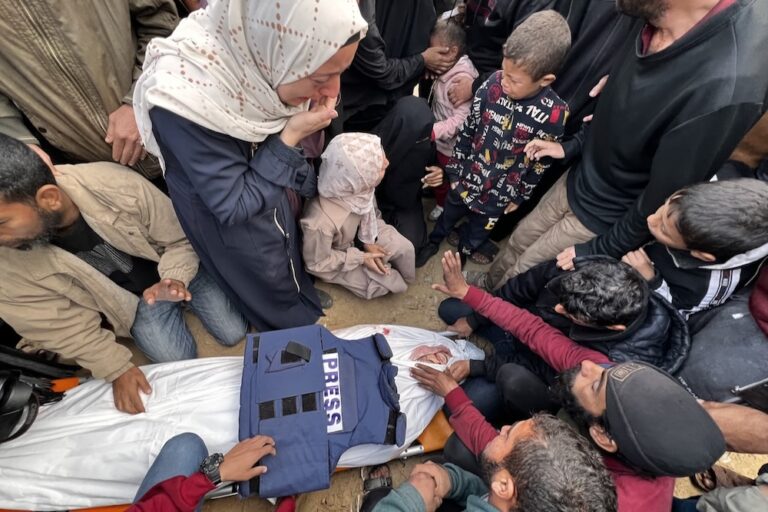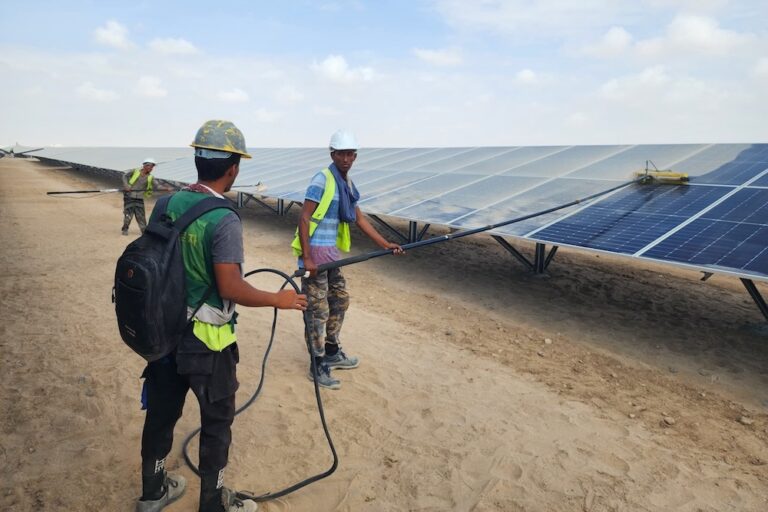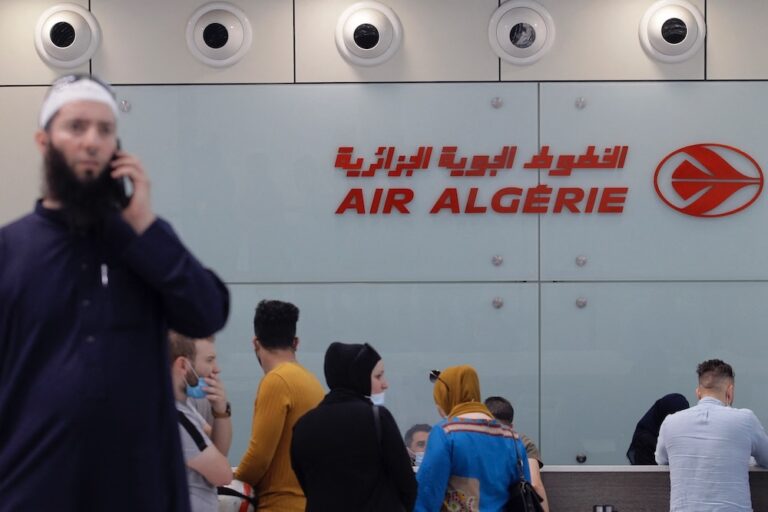April 2022 in Middle East and North Africa: A free expression roundup produced by IFEX's Regional Editor Naseem Tarawnah, based on IFEX member reports and news from the region.
Social media users prosecuted for “immodest” videos in Egypt, systematic targeting of Palestinian journalists amount to ‘war crimes’, journalists battle Pegasus spyware, and Syria toughens cybercrime law penalties.
Egypt: Accountability for Hadhoud, #FreeAlaa, and political prisoner releases
Rights groups, including IFEX members in Egypt, called for accountability in the tragic death of economic researcher Ayman Hadhoud while in state custody. According to investigations, Hadhoud, a member of the liberal Reform and Development Party, was forcibly disappeared in early February, with his family receiving conflicting reports over his whereabouts. The family were notified on 9 April to come the next day to receive the body from the mortuary of Abbasiya Mental Health Hospital where he had reportedly died a month earlier.
“The parties involved in the course of the last days of his life must be held accountable and questioned about what happened to him, whether it was National Security, the Public Prosecution, the Abbasiya Hospital and its administration, or the Forensic Medicine Authority,” said rights groups in a statement.
On 16 April, state security forces arrested journalist Ahmed Al-Bahy on charges of “inciting violence”. A correspondent for local independent news website Masrawy, Al-Bahy was reportedly arrested for his coverage of an 15 April killing of a young man in Al-Sadat City, where police at the scene told Al-Bahy to stop filming and not to publish anything related to the case. Despite complying with the request, Al-Bahy was arrested the following day.
As the Committee to Protect Journalists’ (CPJ) MENA Program Coordinator Sherif Mansour said:
“It has become the norm that Egyptian authorities shut down journalistic investigations into political and human rights issues and imprison journalists covering them. However, shutting down an investigation into a seemingly non-political incident marks a clear attack against the journalism sector in Egypt as a whole.”
In protest of his unjust imprisonment, prominent activist Alaa Abd El Fattah launched a hunger strike last month that is ongoing as of this writing. Family members and activists have repeatedly raised the alarm over his deteriorating health. Adding a new dimension to his case, Abd El Fattah, along with his sisters Mona and Sanaa, recently gained UK citizenship through their mother, mathematics professor and human rights activist Laila Soueif, who was born in London. During a prison visit with family last month, Abd El Fattah made demands to meet the British Consulate and be allowed to communicate with lawyers in the UK.
Last month, new members were appointed to a presidential pardon committee in charge of reviewing political prisoner cases, one which has been largely ineffective since its creation in 2016. As one of the world’s largest jailers of political dissidents, the committee’s revival has brought renewed hope for more releases.
The news came amidst a presidential pardon ahead of Eid al-Fitr that saw the release of 41 political prisoners. Held for months without trial and facing charges ranging from “spreading false news” to “terrorism” charges, those released include Walid Shawky, one of the founders of the April 6 Movement, political activist Hossam Monis, activist Radwa Mohamed, as well as journalists Ammer Abdel-Moneim, Hany Greisha, and Essam Abdeen, as well as Mohamed Salah and Abdo Fayed.
“Immodest” TikToks and viral parodies
Egyptian TikTok influencer Haneen Hossam saw her ten-year prison sentence for “human trafficking” reduced to three years during a retrial. According to rights groups, the case is part of a wider security campaign initiated by the Public Prosecution against women content creators for their online videos. Hossam was initially facing charges of “attacking society’s values” before being acquitted and charged with “human trafficking” for encouraging “immodest” social media activity.
Meanwhile, authorities arrested three content creators for posting satirical videos on TikTok. The group were reportedly detained on charges of “spreading false news” over a satirical song lamenting the country’s rampant inflation, which garnered millions of views.
An Egyptian court also sentenced musicians Hamo Beeka and Omar Kamal to a year in prison and fines, on vague charges of “violating family values in Egyptian society and profiting from a video including dancing and singing.” The charges stem from an October 2020 viral video featuring the artists singing along with Brazilian belly dancer, Lordiana, which has over ten million views.
“Egyptian authorities should not prosecute musicians solely for their artistic expression,” said Joe Stork, deputy MENA director at Human Rights Watch (HRW). “The poorly defined restrictions used to convict these men should be repealed.”
Palestine: Systematic targeting of journalists amount to ‘war crimes’
Incursions by Israeli forces into the Al-Aqsa Mosque compound during the month of Ramadan resulted in mounting attacks on worshippers and journalists covering the scene. Images of journalists being deliberately targeted were also widely shared on social media, with IFEX member the Palestinian Center for Development and Media Freedom (MADA) monitoring dozens of injuries from rubber bullets.
A formal complaint was filed last month with the International Criminal Court (ICC), charging that Israel’s “systematic targeting” of Palestinian journalists and failing to investigate their killings amounts to war crimes. The complaint, filed by the International Federation of Journalists (IFJ), the Palestinian Journalists Syndicate, and the International Centre of Justice for Palestinians, highlights the cases of Palestinian journalists Ahmed Abu Hussein, Yaser Murtaja, Muath Amarneh, and Nedal Eshtayeh – who were killed or wounded by Israeli snipers while covering demonstrations.
“The targeting of journalists and media organisations in Palestine violates the right to life and freedom of expression. These crimes must be fully investigated,” said Anthony Bellanger, IFJ General Secretary.
In the four years since Palestinian journalist Ahmed Abu Hussein was killed by an Israeli sniper while covering one of the “Great March of Return” protests near the Israeli border in the Gaza Strip, Reporters Without Borders (RSF) registered over 140 Israeli violations against Palestinian journalists since these weekly protests began.
Meanwhile, in the fight to hold Israeli surveillance companies accountable for their human rights violations, the Palestinian Digital Rights Coalition (PDRC) welcomed the recent filing of a lawsuit against Israel’s NSO Group for infiltrating the phone of Palestinian-French lawyer and human rights defender Salah Hammouri. A 2021 investigation revealed Hammouri’s phone was illegally hacked by the tech company’s nefarious Pegasus spyware, “depriving him from his right to privacy among others.” The coalition called for an immediate moratorium on the sale, transfer and use of the NSO Group’s Pegasus spyware, among other demands.
In Brief
Ahead of Lebanon’s 15 May parliamentary elections, a report by IFEX member Maharat Foundation found women candidates and activists in Lebanon’s political arena faced gendered attacks, including online bullying and threats of sexual violence.
Qatar: As the 2022 World Cup nears Qatar and FIFA continue to face further scrutiny about their press freedom commitments, IFEX member the Gulf Centre for Human Rights (GCHR) called on authorities to release a number of citizens who participated in, or supported, peaceful protests against discriminatory election laws last year.
Sudan: Since December 2021, security forces have forcibly disappeared and unlawfully detained hundreds of protesters, subjecting them to ill-treatment during detentions, including stripping child detainees and threatening sexual violence against women. According to HRW, protesters are typically detained in police facilities or undisclosed locations before being transferred to prison but without appearing before a court or a prosecutor. “The ruthless and brutal targeting of protesters is an attempt to instil fear, and has largely evaded international scrutiny,” says Mohamed Osman, Sudan researcher at HRW. “For months, security forces have abused and illegally detained hundreds of people, including children, who express their opposition to military rule.”
Syria: A recently ratified cybercrime law could see Syrians imprisoned for up to 15 years for their online free expression. The updated law, which toughens penalties for publishing online content the government finds objectionable, contains several vaguely-defined articles that violate the right to freedom of expression and threaten digital rights and online privacy, according to GCHR.
Bahrain: Over the past year, authorities continued to ostracise political opponents, systematically close civil and political spaces, and mute dissenting voices ahead of upcoming elections, said the Bahrain Center for Human Rights (BCHR) in its latest report on the country’s dire human rights situation. The report highlights last year’s hacking of human rights defenders with Pegasus spyware, and a new restrictive law aimed at controlling dissenting voices in parliament.
Jordan: Four Jordanian journalists and human rights defenders were revealed to have been targeted with NSO’s Pegasus spyware. According to a joint report by rights group Front Line Defenders and digital rights group Citizen Lab, the victims include journalist Suhair Jaradat and human rights lawyer Malik Abu Orabi, with Jordanian government agencies likely behind the attacks.
Noteworthy in artistic expression
On 3 May, Cartoonists Rights Network International (CRNI) and the Freedom Cartoonists Foundation launch a unified international cartoonists’ awards-giving partnership. The Kofi Annan Courage in Cartooning Award will alternate biannually with CRNI’s Robert Russell Courage in Cartooning Award, in continued efforts to “honor extraordinary contributions to freedom of expression made by editorial and political cartoonists, often despite the most difficult of circumstances”
On 25 May, Iranian nonprofit organization The PaykanArtCar will be one of three recipients of this year’s Václav Havel Prize for Creative Dissent. The organization’s art project has brought together contemporary Iranian artists in the diaspora to advocate for human rights in Iran, using a car once belonging to a dictator as their canvas. Once a gift by Mohammad Reza Shah Pahlavi of Iran to the Romanian dictator Nicolae Ceaușescu, the Paykan car now provides a medium for creative expression for Iranian artists in exile, producing designs that call particular attention to the struggle for freedoms amongst Iran’s oppressed LGBTQI+ community.



